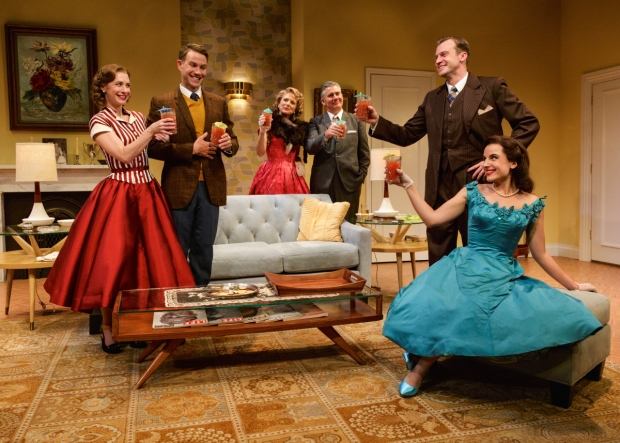Perfect Arrangement

(© James Leynse)
Usually a playwright has to choose between writing a laugh-out-loud comedy and a very serious drama. Topher Payne has written both with Perfect Arrangement, now making its New York City debut with Primary Stages at the Duke on 42nd Street. With a stellar cast and zippy direction from Michael Barakiva, this 1950s sitcom-style comedy set during the Lavender Scare (in which sexual "deviants" were targeted for dismissal from federal employment) manages to keep us in hysterics even as the circumstances become no laughing matter.
It's 1950 and Bob Martindale (a powerful and charming Robert Eli) leads the Personnel Security Board at the Department of State. He lives in Georgetown next door to his secretary, Norma Baxter (Julia Coffey, more commanding than Carly Fiorina). While Norma ostensibly lives with her husband, Jim (television-handsome Christopher J. Hanke), and Bob lives with his wife, Millie (Mikaela Feely-Lehmann), this is just a heteronormative front to disguise the truth: Bob loves Jim, and Norma loves Millie. Once the prying eyes of the outside world are gone, they retreat from their spouses to their respective lovers. This plan seems brilliant until Bob's boss, Mr. Sunderson (Kevin O'Rourke), tasks him with rooting out homosexuals from the State Department, threatening the stability of this seemingly perfect arrangement.
Payne arranges the dominoes beautifully in the first act, knocking them down in the second. The result isn't as spectacular as one might hope, although it gets off to an auspicious start: When bisexual translator Barbara Grant (a deliciously sharp and utterly fabulous Kelly McAndrew) arrives to speak to Bob directly about her recall from foreign service, Millie recognizes her as the poetry professor (!) with whom she had a fling back in her school days. Feely-Lehmann kills in this scene, ludicrously drinking coffee creamer and beating the couch pillows together in an attempt to distract Barbara. With a cast of such gifted comedians, it's somewhat disappointing that Perfect Arrangement doesn't quite reach the farcical heights of your average episode of I Love Lucy: There's very little running-around, and an ottoman conspicuously placed between the swinging door and the coffee table feels like a missed opportunity for a Dick Van Dyke-style pratfall.
Still, the thematic idiosyncrasy and cloak-and-dagger intrigue undergirding Perfect Arrangement is enough to keep any audience riveted for two hours. Payne digs into the issue with a complexity that never feels didactic. Rather than merely waving the rainbow flag, he points out how misogyny can be particularly noxious among gay men: "I say it's time we acted like men and got some control over our f*cking wives," Jim tells Bob right before they cut off Norma's bank account (yes, husbands used to be able to do that sort of thing). There are no pure heroes or villains in this story, and Payne has some heartbreaking things to say about how shallow trust can be when everybody has something to hide.
And these creatures of Washington have a gorgeous environment in which to camouflage thanks to Barakiva's keen eye: Neil Patel creates a handsome apartment (Life magazines arrayed under a glass coffee table), laying out the playing space with ample room for physical comedy. High heels match the synthetic fabrics of the beautiful period dresses designed by Jennifer Caprio. Mr. Sunderson's wife, Kitty (a hilarious Jennifer Van Dyck), wears a stole (that only lightly deviates from the dead animal used to create it) around her shoulders during the first scene in which they all sit around drinking specialty cocktails with little Hawaiian umbrellas. It's like watching a live colorized version of your favorite 1950s sitcom…but with gays.
Payne traffics in some gleeful hindsight on that front: "The last hurdle we have to overcome isn't Peurifoy, or Sunderson, or J. Edgar Hoover," Barbara tells the assembled foursome of federal closet cases. "It's people like you, who live this life but are too overcome by cowardice to defend it." We all know she's right, but it would have taken some real courage to recognize it from the vantage point of 1950. At turns joyous and bittersweet, Perfect Arrangement celebrates that courage in its nascence.











